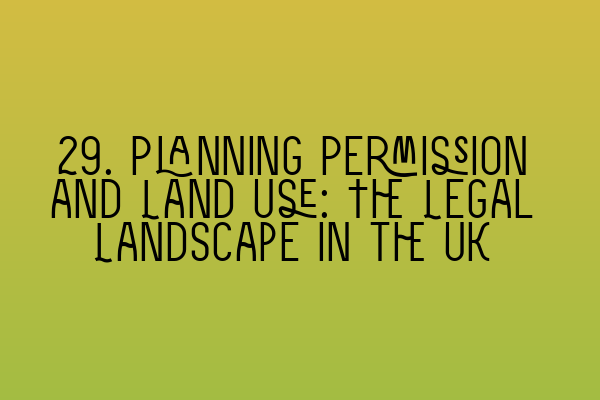29. Planning Permission and Land Use: The Legal Landscape in the UK
Welcome to SQE Property Law & Land Law’s blog! In today’s post, we will be discussing planning permission and land use in the UK. This topic is of utmost importance in the field of property law, as it governs how land can be developed and utilized, and has significant implications for property owners, developers, and local communities alike.
Before diving into the legal landscape surrounding planning permission and land use, it is essential to have a clear understanding of the basic terminology.
What is Planning Permission?
In the UK, planning permission refers to the formal consent required from the local planning authority to carry out certain types of development on a property. It is necessary for a wide range of projects including building new structures, changing the use of existing buildings, or making significant alterations to a property.
Obtaining planning permission is a fundamental step in the property development process, and failure to obtain permission can result in severe consequences, including fines and even demolition of unauthorized structures. It is therefore crucial for property owners, developers, and investors to navigate the intricate planning permission system in the UK.
The Planning Permission Process
The planning permission process can be complex and time-consuming. It involves multiple stages and requires adherence to various regulations and statutory obligations.
1. Pre-Application Stage
At the pre-application stage, it is advisable to seek professional advice from a solicitor specializing in property law or a planning consultant. They can help assess the feasibility of your project and guide you through the process.
SQE 1 Practice Exam Questions available online provide an excellent resource for familiarizing yourself with the legal concepts related to planning permission and land use. Employing such resources can significantly enhance your knowledge and preparation for a smooth planning permission application process.
2. Submitting the Application
Once you have thoroughly reviewed your project plans and complied with any necessary requirements, it is time to submit your planning permission application. The application should include detailed information about the proposed development, such as architectural drawings, site plans, and anticipated impacts on the local environment.
3. Local Authority Assessment
Upon receipt of your application, the local planning authority will review it thoroughly. They will consider various factors, including the impact on the surrounding area, compliance with local development plans, and potential objections from neighboring properties.
4. Public Consultation and Decision
In some cases, the local planning authority may undertake a public consultation process to gather opinions and feedback from the local community. After carefully considering all relevant information and feedback, they will then make a decision on whether to grant planning permission.
SQE 1 Practice Mocks FLK1 FLK2 are invaluable tools to assess your understanding of the planning permission process and ensure thorough preparation for any associated exams or assessments.
Land Use Regulations and Policies
Land use regulations and policies play a crucial role in determining how land can be utilized. These regulations are often set at both national and local levels.
The National Planning Policy Framework (NPPF) provides guidance for planning authorities across England on various matters, including sustainable development, economic growth, and environmental protection. It seeks to strike a balance between development and conservation while ensuring the efficient and effective use of land.
At the local level, Local Development Plans (LDPs) are prepared by local planning authorities for each area. These plans outline the specific policies and proposals for land use in their jurisdiction and must be consistent with the overarching NPPF.
If you are looking to gain a more detailed understanding of land use regulations in the UK, it is highly recommended to undertake SQE 2 Preparation Courses that cover this topic comprehensively.
Conclusion
Planning permission and land use are vital considerations for anyone involved in property development in the UK. By familiarizing yourself with the planning permission process, understanding the relevant regulations, and seeking professional advice when required, you can navigate the legal landscape effectively.
If you are interested in further preparing for the legal aspects of planning permission and land use, SQE Property Law & Land Law offers comprehensive SQE 1 Preparation Courses that cover a wide range of property law topics. Stay updated on the latest SRA SQE Exam Dates to plan your studies effectively.
Ensure you equip yourself with the necessary knowledge and skills to successfully navigate the legal landscape surrounding planning permission and land use!
